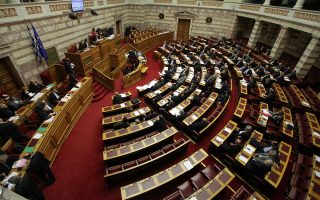Gov’t must overcome political concerns

The government is about to start tough negotiations with the country’s creditors over painful reforms and fiscal measures. At the same time, the conservative New Democracy party appears to be taking the lead in opinion polls. This makes many market participants wonder what stance the government will take. Will it stick to the present course or revert to populist tactics?
In May 2014, following the defeat of the conservatives in the elections for the European Parliament, former premier Antonis Samaras chose to reshuffle his cabinet by giving the boot to some reformist ministers like Costis Hatzidakis and Thanasis Skordas, replacing them with some right-wing populists.
To be fair, Samaras was also under pressure from his vice president and PASOK leader Evangelos Venizelos, whose party fared so poorly there were doubts whether it would be able to get the minimum 3 percent of the vote in the next general election. Also, they both knew they did not have enough votes to elect a new president, making elections in the first quarter of 2015 a real possibility. They were right but the events did not vindicate their turn toward a more populist approach in economic policy, leading to inertia and more aggressive tactics towards the country’s lenders in meetings held in Paris.
So, it does comes as no surprise that fund managers and other investors wonder today how Prime Minister Alexis Tsipras will react if opinions polls show the conservative New Democracy party well ahead consistently and the creditors stick to their demands for reforms in pensions and more fiscal measures. According to informed sources, the European Commission, the IMF, the ECB and the ESM will likely ask the government to identify and legislate measures equal to 2 percent of GDP or some 3.4 billion euros. Most of the measures will go into effect in the next couple of years to ensure Greece satisfies the 3.5 percent of GDP primary surplus target in 2018. This is in addition to other pending reforms such as the new non-performing loan (NPL) law, facilitating the disposal of bank loans to foreign distress funds.
It is obvious the measures entail a good deal of political cost and the government will have to pass them by most likely relying on the 153 deputies of the ruling leftist SYRIZA party and the right-wing populist Independent Greeks (ANEL) in the 300-seat Parliament. This will not be easy since a lot of them have campaigned against austerity in the last few years and over the course of their careers. On the other hand, power is attractive and no one wants to be held responsible for toppling the first-ever leftist government.
Coming back to the fund managers who are trying to figure out how the government will react to the new situation, we should stress a major difference between the present period and May 2014. The next general election is over three years away and snap polls could be held only if the government losses its majority in Parliament. So, this administration has plenty of time to prove to the people that it made the right choices by sticking to reforms and austerity and claim it led the country out of the MoU era and returned it to growth.
This explains why the government is in a hurry to complete the first two reviews of the new bailout program. It hopes the successful completion of the first review in particular will allow the ECB to accept again Greek securities as collateral in its financing operations, reducing the cost of funding for local banks and boosting their shares on the Athens stock exchange. It will also justify credit rating upgrades by the major rating agencies, driving down the yields of Greek bonds. The latter, along with the hoped-for return to economic growth in the second half of the year, would help the country access international markets, creating a virtuous cycle.
In addition to time, another factor that may play a role in the government’s adherence to the agreement it signed last summer is communication. The administration has the ability to put across its message to the people effectively and undermine the positions of its political opponents. This means it can present reforms in a way that limits the political cost. It is clear, for example, that it wants to offset part of the fallout from the expected pension reforms with a campaign against corruption and perhaps some foreign investments like Canada’s Eldorado. However, there is no guarantee communication tactics that were effective in the past will work again. The backfiring of the nepotism issue brought up by government sources against Kyriakos Mitsotakis reminds of the constraints.
All the above are largely arguments that the government will honor its commitments to the lenders despite falling behind in opinion polls. However, there is always a threshold of tolerance for certain reforms and other austerity measures. This applies to some cabinet members and parliamentary deputies. One cannot rule out the possibility that the government will dig in its heels over certain issues and a deadlock in the negotiations. It could also bring up the refugee and immigration issue, asking for softer treatment.
Of course, anything can happen. However, everybody understands that any hope for economic recovery will die out if the economy is not financed properly for a long time. Greece has not received more than 5.5 billion euros from the ESM because the first review of the program has not been concluded. So, the economic and political consequences of friction with lenders over disagreements on reforms would be more dire than the conservatives getting well ahead of SYRIZA in opinion polls.
[Kathimerini English Edition]





